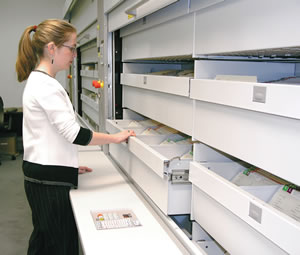University of Richmond
Project Snapshot
PROJECT:
Shelving and
Productivity Upgrade
INSTITUTION:
University of Richmond
LOCATION:
Richmond, VA
COMPANY NAME:
National Joint Powers Alliance
WEBSITE:
www.njpacoop.org

By replacing bulky filing cabinets with Kardex Remstar’s Electronic Lateral Filing System with help from NJPA, the University of Richmond boosted employee productivity and improved the security of student records.
THE CHALLENGE
With nearly 3,000 full-time students attending the
University of Richmond, the Admissions Office is always a
busy place. It has over 6,500 files it needs to keep immediately
accessible to select staff while also keeping student
information safe and organized.
Its lateral filing cabinet setup took up 820 square feet.
Its entire bottom row of filing space was used for non-file
storage and the entire top row of filing space went unused
because it was unreachable for some office staff. Files were
difficult to locate, staff had to contort their bodies to reach or
read files, documents weren’t secure and valuable shelf space
was wasted. The admissions office admitted it was time to
find a better solution, something more efficient, secure,
ergonomic and affordable.
THE SOLUTION
After considerable research, the admissions office
decided on mobile shelving. Upgrading to automated systems
was a sizeable investment, but because of its National
Joint Powers Alliance (NJPA) membership the university
was able to choose the system it wanted from a reputable
company at an affordable cost — all in a timely manner.
The university’s purchasing agency bought two Kardex
Remstar Lektriever Electric Lateral Filing Systems (ELFs) with
an automated vertical carousel design. The systems solved a
four-pronged problem for the university by increasing staff
productivity, improving safety and accessibility, providing
greater file security and utilizing just 414 square feet of office
space, 50 percent less than the previous system.
Staff members are now able to simply push a button
and have the file presented to them at an ergonomic level,
providing safe and easy access to student files at all times.
Roll-out drawers and overhead light provide easy-to-read
access to the correct folders and files, and included work
counters create a convenient review space right at the shelves
for quick re-filing. With bi-parting doors, the ELFs can be
easily locked/unlocked, and the system’s’ Safety Information
Panel (SIP) alerts staff if a drawer is left open.
IMPACT ON LEARNING
The day-to-day operations are much smoother within
the University of Richmond’s Admissions Office thanks to its
Kardex Remstar systems. Staff utilize improved ergonomics,
student information is more secure and the compact file systems
free up floor space, making the office more productive
and better able to serve students.
NJPA members have access to Kardex Remstar’s automated
storage solutions through contract 040215-KRS. Learn
more: http://njpa.co/KardexRemstar.
Editor’s Review
FERPA (the Family
Educational Rights and
Privacy Act) protects the
privacy of student education
records, so it is vital
that institutions meet its
provisions. By investing in
an automated filing system,
the University of Richmond
not only has improved
working conditions for
its staff, but also has increased
both organization
and security of its students
records and aligned itself
well for FERPA compliance.
This article originally appeared in the issue of .